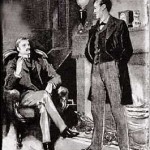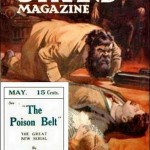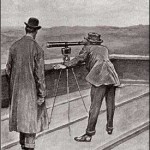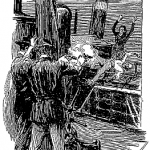“Bad discipline, very bad,” Baumser remarked. “To break the ranks and run mit knives would make my old Unter-offizier Kritzer very mad indeed.” The German had served his time in the Prussian Army, and was still mindful of his training.
“Your stiff-backed Pickelhaubes would have had a poor chance in the
passes,” answered the major. “It was ivery man for himself there.
You might lie, or stand, or do what you liked as long as you didn’t run.
Discipline goes to pieces in a war of that sort.”
“Dat is what you call gorilla warfare,” said Von Baumser, with a proud consciousness of having mastered an English idiom. “For all dat, discipline is a very fine thing—very good indeed. I vell remember in the great krieg—the war with Austria—we had made a mine and were about to fire it. A sentry had been placed just over this, and after the match was lit it was forgotten to withdraw the man. He knew well that the powder beneath him would presently him into the air lift, but since he had not been dismissed in right form he remained until the ausbruch had exploded. He was never seen no more, and, indeed, dat he had ever been dere might well have been forgotten, had it not been dat his nadelgewehr was dere found. Dat was a proper soldier, I think, to be placed in command had he lived.”
“To be placed in a lunatic asylum if he lived,” said the Irishman testily. “Hullo, what’s this?”
The “this” was the appearance of the boarding-house slavey with a very neat pink envelope upon a tray, addressed, in the most elegant of female hands, to “Major Tobias Clutterbuck, late of Her Majesty’s Hundred and Nineteenth.”
“Ah!” cried Von Baumser, laughing in his red beard, “it is from a woman. You are what the English call a sly hog, a very sly hog—or, I should say, dog, though it is much the same.”
“It’s for you as well as for me. See here. ‘Mrs. Lavinia Scully presints her compliments to Major Tobias Clutterbuck and to his friend, Mr. Sigismund von Baumser, and trusts that they may be able to favour her with their company on Tuesday evening at eight, to meet a few frinds.’ It’s a dance,” said the major. “That accounts for the harp and the tables and binches and wine cases I saw going in this morning.”
“Will you go?”
“Yes, of course I will, and so shall you. We’d better answer it.”
So in due course an acceptance was sent across to Mrs. Scully’s hospitable invitation.
Never was there such a brushing and scrubbing in the bedroom of a couple of quiet bachelors as occurred some two evenings afterwards in the top story of Mrs. Robins’ establishment. The major’s suit had been pursued unremittingly since his first daring advance upon the widow, but under many difficulties and discouragements. In the occasional chance interviews which he had with his attractive neighbour he became more and more enamoured, but he had no opportunity of ascertaining whether the feeling was mutual. This invitation appeared to promise him the very chance which he desired, and many were the stern resolutions which he formed as he stood in front of his toilet-table and arranged his tie and his shirt front to his satisfaction. Von Baumser, who was arrayed in a dress coat of antiquated shape, and very shiny about the joints, sat on the side of the bed, eyeing his companion’s irreproachable get-up with envy and admiration.
“It fits you beautiful,” he said, alluding to the coat.
“It came from Poole’s,” answered the major carelessly.
“As for me,” said Von Baumser, “I have never used mine in England at all. Truly, as you know, I hate all dances and dinners. I come with you, however, very willingly, for I would not for nothing in the world give offence to the liebchen of my comrade. Since I go, I shall go as a gentleman should.” He looked down as he spoke with much satisfaction at his withered suit of black.
“But, me good fellow,” cried the major, who had now completed his toilet, “you’ve got your tie under your lift ear. It looks very quaint and ornamintal there, but still it’s not quite the place for it. You look as if you were ticketed for sale.”
“They von’t see it unless I puts it out sidevays from under my beard,” the German said apologetically. “However, if you think it should be hidden, it shall be so. How are my stud-buttons? You have them of gold, I see, but mine are of mother-of-oysters.”
“Mother-of-pearl,” said the major, laughing. “They will do very well. There’s the divil of a lot of cabs at their door,” he continued, peering round the corner of the blind. “The rooms are all lighted up, and I can hear them tuning the instruments. Maybe we’d better go across.”
“Vorvarts, then!” said Von Baumser resolutely; and the two set off, the major with a fixed determination that he should know his fate before the evening was over.





